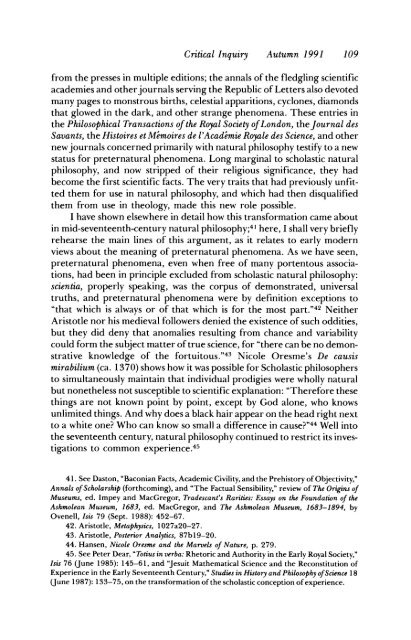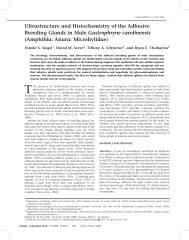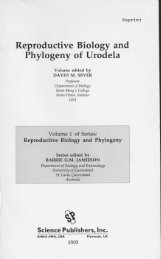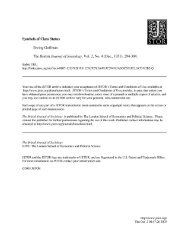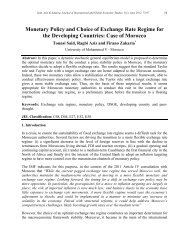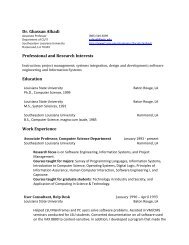Marvelous Facts and Miraculous Evidence in Early Modern Europe ...
Marvelous Facts and Miraculous Evidence in Early Modern Europe ...
Marvelous Facts and Miraculous Evidence in Early Modern Europe ...
Create successful ePaper yourself
Turn your PDF publications into a flip-book with our unique Google optimized e-Paper software.
Critical Inquiry<br />
Autumn 1991<br />
from the presses <strong>in</strong> multiple editions; the annals of the fledgl<strong>in</strong>g scientific<br />
academies <strong>and</strong> other journals serv<strong>in</strong>g the Republic of Letters also devoted<br />
many pages to monstrous births, celestial apparitions, cyclones, diamonds<br />
that glowed <strong>in</strong> the dark, <strong>and</strong> other strange phenomena.<br />
These entries <strong>in</strong><br />
the Philosophical Transactions of the Royal Society of London, the Journal des<br />
Savants, the Histoires et Memoires de l'Academie Royale des Science, <strong>and</strong> other<br />
new journals concerned primarily with natural philosophy testify to a new<br />
status for preternatural phenomena. Long marg<strong>in</strong>al to scholastic natural<br />
philosophy, <strong>and</strong> now stripped of their religious significance, they had<br />
become the first scientific facts. The very traits that had previously unfit-<br />
ted them for use <strong>in</strong> natural philosophy, <strong>and</strong> which had then disqualified<br />
them from use <strong>in</strong> theology, made this new role possible.<br />
I have shown elsewhere <strong>in</strong> detail how this transformation came about<br />
<strong>in</strong> mid-seventeenth-century natural philosophy;41 here, I shall very briefly<br />
rehearse the ma<strong>in</strong> l<strong>in</strong>es of this argument, as it relates to early modern<br />
views about the mean<strong>in</strong>g of preternatural phenomena. As we have seen,<br />
preternatural phenomena, even when free of many portentous associa-<br />
tions, had been <strong>in</strong> pr<strong>in</strong>ciple excluded from scholastic natural philosophy:<br />
scientia, properly speak<strong>in</strong>g, was the corpus of demonstrated, universal<br />
truths, <strong>and</strong> preternatural phenomena were by def<strong>in</strong>ition exceptions to<br />
"that which is always or of that which is for the most part."42 Neither<br />
Aristotle nor his medieval followers denied the existence of such oddities,<br />
but they did deny that anomalies result<strong>in</strong>g from chance <strong>and</strong> variability<br />
could form the subject matter of true science, for "there can be no demon-<br />
strative knowledge of the fortuitous."43 Nicole Oresme's De causis<br />
mirabilium (ca. 1370) shows how it was possible for Scholastic philosophers<br />
to simultaneously ma<strong>in</strong>ta<strong>in</strong> that <strong>in</strong>dividual prodigies were wholly natural<br />
but nonetheless not susceptible to scientific explanation: "Therefore these<br />
th<strong>in</strong>gs are not known po<strong>in</strong>t by po<strong>in</strong>t, except by God alone, who knows<br />
unlimited th<strong>in</strong>gs. And why does a black hair appear on the head right next<br />
to a white one? Who can know so small a difference <strong>in</strong> cause?"44 Well <strong>in</strong>to<br />
the seventeenth century, natural philosophy cont<strong>in</strong>ued to restrict its <strong>in</strong>ves-<br />
tigations to common experience.45<br />
109<br />
41. See Daston, "Baconian <strong>Facts</strong>, Academic Civility, <strong>and</strong> the Prehistory of Objectivity,"<br />
Annals of Scholarship (forthcom<strong>in</strong>g), <strong>and</strong> "The Factual Sensibility," review of The Orig<strong>in</strong>s of<br />
Museums, ed. Impey <strong>and</strong> MacGregor, Tradescant's Rarities: Essays on the Foundation of the<br />
Ashmolean Museum, 1683, ed. MacGregor, <strong>and</strong> The Ashmolean Museum, 1683-1894, by<br />
Ovenell, Isis 79 (Sept. 1988): 452-67.<br />
42. Aristotle, Metaphysics, 1027a20-27.<br />
43. Aristotle, Posterior Analytics, 87b 19-20.<br />
44. Hansen, Nicole Oresme <strong>and</strong> the Marvels of Nature, p. 279.<br />
45. See Peter Dear, "Totius <strong>in</strong> verba: Rhetoric <strong>and</strong> Authority <strong>in</strong> the <strong>Early</strong> Royal Society,"<br />
Isis 76 (June 1985): 145-61, <strong>and</strong> "Jesuit Mathematical Science <strong>and</strong> the Reconstitution of<br />
Experience <strong>in</strong> the <strong>Early</strong> Seventeenth Century," Studies <strong>in</strong> History <strong>and</strong> Philosophy of Science 18<br />
(June 1987): 133-75, on the transformation of the scholastic conception of experience.


